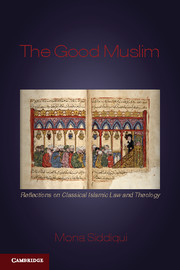Book contents
- Frontmatter
- Contents
- Acknowledgements
- Introduction
- 1 Spoken, Intended, and Problematic Divorce in Hanafī Fiqh
- 2 Between Person and Property: Slavery in Qudūrī’s Mukhtaṣar
- 3 Pig, Purity, and Permission in Mālikī Slaughter
- 4 Drinking and Drunkenness in Ibn Rushd
- 5 Islamic and Other Perspectives on Evil
- 6 The Language of Love in the Qur’ān
- 7 Virtue and Limits in the Ethics of Friendship
- Glossary
- Bibliography
- Index
4 - Drinking and Drunkenness in Ibn Rushd
Published online by Cambridge University Press: 05 July 2012
- Frontmatter
- Contents
- Acknowledgements
- Introduction
- 1 Spoken, Intended, and Problematic Divorce in Hanafī Fiqh
- 2 Between Person and Property: Slavery in Qudūrī’s Mukhtaṣar
- 3 Pig, Purity, and Permission in Mālikī Slaughter
- 4 Drinking and Drunkenness in Ibn Rushd
- 5 Islamic and Other Perspectives on Evil
- 6 The Language of Love in the Qur’ān
- 7 Virtue and Limits in the Ethics of Friendship
- Glossary
- Bibliography
- Index
Summary
Several years ago, a distinguished professor of Islamic Studies from North Africa said to me as he drank a glass of wine, ‘Mona, you should have one. Enjoy one glass, God will not smite you over one glass.’ His tone was affectionate and sincere, and although I didn’t drink any wine then nor since, his words have stayed with me. I was brought up in a religious and cultural environment where alcohol never featured as any part of daily personal, ritual, or communal life. Yet I soon learnt that my own complete abstinence was simply one way of reflecting an understanding of the divine message; for many other Muslims, abstinence was not part of this understanding. It was not until I began to look at fiqh texts that I understood the contrast between traditional piety and complex legality when analysing the ambiguities inherent in conceptualising prohibited acts in Islam; wine drinking is one of them. In this chapter I wish to focus on the issue of wine drinking as a conceptual intoxicant as discussed by the Andalusian jurist and philosopher Ibn Rushd in one of his most celebrated legal works, Bidāyat al-Mujtahid wa-Nihāyat al-Muqtasid. While most legal schools developed the view that drinking wine was a crime and liable to punishment, there lay an ambivalence surrounding wine consumption and intoxication. It seems that the Qur’ān condemns wine drinking in certain inappropriate contexts, only leading one to argue that its condemnation of wine consumption is neither uniform nor absolute.
- Type
- Chapter
- Information
- The Good MuslimReflections on Classical Islamic Law and Theology, pp. 90 - 105Publisher: Cambridge University PressPrint publication year: 2012



